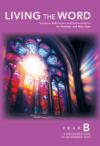Scripture Study for
Thirty-Second Sunday in Ordinary Time
Maccabees 7:1–2, 9–14 / Psalm 17:15b / 2 Thessalonians 2:16 — 3:5 / Luke 20:27–38 [20:27, 34–38]
<< Back to LECTIONARY RESOURCES
Understanding the Word
By Br. John R. Barker, OFM
The Second Book of Maccabees recounts the efforts of devout Jews to oppose the Hellenist rulers who sought to undermine their adherence to their faith. One such ploy was to try to force them to eat pork; more than one Jew accepted death rather than disobey the Law at the command of secular rulers (6:18–31). Aside from its edifying tale of seven faithful brothers and their mother, the present passage gives us the clearest expression in the Old Testament of belief in bodily resurrection (along with Daniel 12:1–3). Hope that they would be raised up by God even if they died faithful to God allowed all seven sons to die excruciating deaths. Both fidelity and great hope are on display in these early tales of Jewish martyrs.
In the face of social disapproval, perhaps some civic persecution, and the confusion and disturbance caused by the claim by some that the parousia has already occurred (a claim that, if true, would have to lead one to question everything that one had been taught, since nothing had changed in the world), Paul exhorts the Thessalonians to calm down, ignore the false claims, and remain steadfast. Divine encouragement will strengthen them against the profound temptations to abandon the faith and their way of life in Christ. Paul too has his work to do, spreading the gospel as far as he can while he has time, in order to bring as many as possible to salvation. No matter what, they must remember a central claim of scripture: God is faithful. Just hold fast, keep steady, trust in what they have been taught, and above all, trust in God’s love. In this, as in all things, they should look to Christ as their model.
The Sadducees were a Jewish group who rejected any doctrine not clearly taught in Torah (Genesis through Deuteronomy). Thus, unlike the Pharisees, they did not believe in resurrection. They take the opportunity here to argue with Jesus about the question by trying a little reductio ad absurdum. The challenge they pose has to do with the institution known as levirate marriage, in which a brother of a deceased man was required to marry his widow if they had had no children. What if that same woman ended up marrying seven brothers? What a complete mess in the age to come! This is taken as an argument against resurrection. Jesus breezily dismisses it as misunderstanding the nature of the age to come. Since people will no longer die, there will be no need for marriage or to raise children. Using an authoritative source they will acknowledge, he points out that God could hardly be the God of Abraham, Isaac, and Jacob centuries after they had left this earth if they were not in fact still alive to God.
